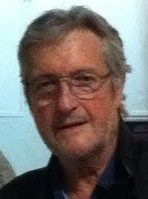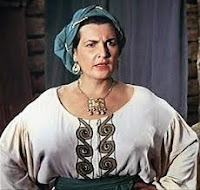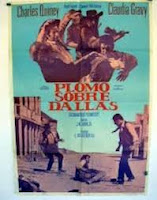The actor and director received the CNA La Chioma di
Berenice Lifetime Achievement Award as part of the International Cinearti
Award, now in its twenty-fifth edition
CIAK
By Caterina Sabato
July 18, 2024
82 years old, a very strong temperament, always on the
set around the world: Franco Nero is a tireless icon of cinema who last night
was honored at the Summer Arena of the Casa del Cinema in Rome with the career
award La Chioma di Berenice CNA, presented to him by Antonio Flamini, artistic
director of the International Cinearti Award, now in its twenty-fifth edition,
with the following motivation: "Eclectic, original and highly professional
interpreter, he was a priceless protagonist of the Italian spaghetti western,
therefore free from schemes and prejudices: he fascinated young and old with
his intense blue eyes, crossing cinema in the widest of ways, from the great
authors to the most popular and commercial films, but always with extreme
competence. Franco Nero is awarded the Chioma di Berenice Lifetime Achievement
Award".
More than 200 roles played by the actor directed by
masters of cinema from all over the world: from John Huston to Rainer Werner
Fassbinder, and then Sergio Corbucci, Elio Petri, Luis Buñuel, Claude Chabrol,
many meetings that have marked his life, such as the one with the legendary
Laurence Olivier, many indelible roles, such as the legendary Django of the
cult of the same name by Sergio Corbucci, still today an inspiration for films
and series.
But for Franco Nero the time has not yet come to stop. We
interviewed him.
The Chioma di Berenice CNA for lifetime achievement is
just the latest of the many awards she has received, is it always an emotion or
do you get used to it?
"You get used to it, and then I tell you the truth,
I also touch my balls because the lifetime achievement award is given to actors
who no longer work, who are retired, and fortunately I still work a lot around
the world, I am in great demand. Of course I am pleased and I add it to the
others, I will have about a thousand ".
In fact, you continue to be very prolific both as an
actor and as a director, it's as if you don't breathe outside the set...
"I like to be on set, I like to be with the crew,
electricians, stagehands, cinematographers, with the actors, when I work I
never think about whether the film will be successful, I just want to have
fun".
Has it always been like this or were you a little more
worried about the outcome of the film when you were young?
"But no, I've always been so sincerely."
[Franco Nero with Antonio Flamini, artistic director of
the La Chioma di Berenice Prize]
Do you already have other films in the pipeline?
"Yes, two as a director that I will also play, one
is called Parsifal, inspired by Wagner's opera, and the other is a film called
The Secret Lies Within, a very beautiful story between a couple in their
forties, husband and wife. And then I have many proposals as an actor, many I
have already rejected, I have become very difficult, at my age I want to do the
things I really like. A great American writer called John Sayles wrote a
screenplay, Django lives!, they proposed me to be the protagonist, Django again,
we hope to be able to do it, production has not yet started. I have just
returned from London where I shot an English film directed by my son, Carlo
Gabriel, with his mother and my wife, Vanessa Redgrave, with my son's wife, the
grandchildren, in short, a "family" film, and then there are
extraordinary English actors, it will be released next year".
You have
practically toured all genres, but is there one that you prefer in particular?
"No, look, I think that when there is a good script,
good actors and a good director, any genre is fine. I missed playing the
character of the Pope and two years ago I agreed to shoot The Pope's Exorcist
with Russel Crowe! I've done detective, mystery, political, action, western,
horror films, I've always had a lot of fun, I really like to change my face
too, transform myself physically".
Among all the encounters you have had in your life, is
there anyone who has particularly inspired you, even in the role you later had
as a director?
"I've worked with the greatest directors in the
world: with Buñuel from Spain, Fassbinder from Germany, I've worked with
Chabrol in France, he worked with Quentin Tarantino. And then with Elio Petri,
he was the greatest Italian director, I have always considered him the Italian
Kubrick, that is, he made 10 films all completely different from each other,
while the others always made the same film, but he was always innovative. It is
logical that working with all of them I have always "stolen"
something".
What does it feel like to be a world icon, an
inspiration for great artists like Quentin Tarantino?
"Well, a lot of satisfaction, it means that I have
done a good job in my life, it means that I have left my mark. Tarantino has
always been a fan of mine, he told me, when he was 14 he started working in a
video store and began to see my films, to look for those that did not arrive in
America to see them all. He still remembers the jokes, the music, look, it's
impressive."
What do you like about today's cinema? What do you
think in particular of Italian cinema?
"Honestly, it's not that I follow him much because
I'm always around the world, but I notice that he's recovering, there are good
directors, there's a whole new generation that makes good films. It means that
there is hope for the future. A short time ago I was in the United States and I
gave an award to Matteo Garrone, I think he is a very good director, he too
always chooses particular topics".
[Franco Nero with the La Chioma di Berenice CNA Lifetime
Achievement Award]
I ask you a somewhat risky question: how do you think
your career would have gone if you had been born in this era?
"Look, I don't know, if we want to talk about Italy
today there are clans, there are clubs, if you are not part of them it is
difficult to work. I've always been a free spirit, and maybe I'd have more
difficulty working, then in my time people dreamed of the actor on the big
screen, they wanted beauty on the screen. I remember going to the cinema to see
Marlon Brando, Paul Newman, beautiful faces, today I saw that accountant faces
are more popular (laughs)".
And she has
never had the face of an accountant. Perhaps the dream of cinema at some point
was supplanted by television, which you criticize in your last film as a
director, The Man Who Drew God (released in 2022) ...
"I made that film because I wanted to focus on a few
things: I liked the world of the blind, then I wanted to talk about
immigration, there are an African mother and daughter who come to Italy and
face a series of problems, then racism, then the loneliness of old age, I
wanted to talk about junk TV that takes advantage of the misfortunes of
others... Unfortunately in Italy my film did not have a great distribution, but
fortunately I made good sales, it was considered for the Golden Globes in
America, but Matteo Garrone's Io capitano was rightly chosen".
And in his film he chose to have Kevin Spacey play a
small part, the first role after the accusations of sexual abuse that cut short
his career...
"In the meantime he has been exonerated both in
America and in England. America is a strange people, it does not forget. Spacey
is the greatest living actor, it's a shame, when I offered him a role in my
film I explained to him that it was a small part, and he replied: "It
doesn't matter, I want to be on set". In life you always have to give
everyone a second chance."
When you think of her, you automatically associate her
with Django, do you like it?
"Sean Connery used to tell me, 'I've done a lot of
movies, but everyone always thinks of James Bond!' And that's okay, I'm always
considered the original Django, last year my autobiography was released which
is entitled Django and the others (published by Rai Libri), and at the end of
the book I give a speech to Django, I tell him "you made me popular all
over the world, but you forget that I played characters of 30 different
nationalities", in short, a fairly funny dialogue".
If you could choose how to be remembered, what would
you prefer?
"Look, I was lucky enough to work with the greatest
actors in the world, American actors, English, among them the greatest who was
Laurence Olivier, who once told me: "Well, of course you have a beautiful
physique, you could always be a hero, as the Americans do, clean, clean-shaven,
winning, but what a monotony! Or you are an actor, you change roles all the
time, you will have ups and downs in your career, but in the long run you will
reap the rewards". And I followed his advice."
















































